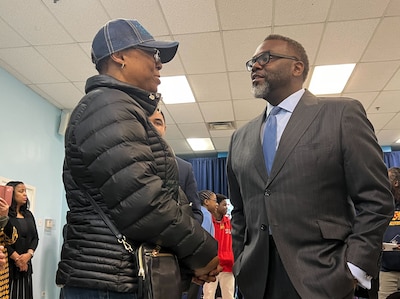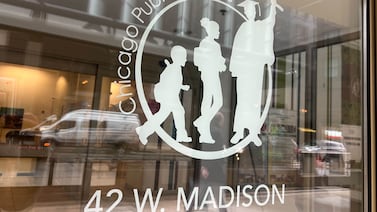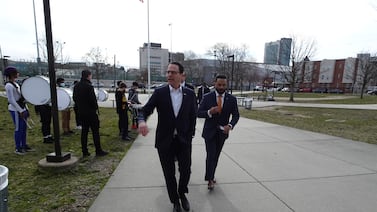Sign up for Chalkbeat Chicago’s free daily newsletter to keep up with the latest education news.
The city of Chicago is using pandemic relief money to offer $500 grants to students with disabilities who come from low-income families, Mayor Brandon Johnson announced Tuesday.
Families need to apply for the one-time grants, which will be awarded to up to 8,000 people.
The Mayor’s Office for People with Disabilities is partnering with Ada S. McKinley Community Services to distribute $5 million through the new Diverse Learners Recovery Fund, supported by American Rescue Plan dollars, which the federal government distributed to help cities and states recover from the pandemic. Chicago received nearly $1.9 billion in those funds, which must be allocated for spending by December 2024, according to the city.
Most of the dollars in the Diverse Learners Recovery Fund will go toward grants to families, while $1 million is reserved to cover administrative costs for Ada S. McKinley Community Services, according to a spokesperson for the mayor’s office.

Sherry Henry, a Hyde Park mother of a 12-year-old boy with autism, said her family had spotty access to the internet during remote school, which made it difficult for her son to log onto virtual classes, leading him to fail a math class.
She did not have to pay for services out of pocket, but she says she could use the grant to buy supplies to help him with dealing with his sensory integration, a disorder that impacts his ability to process his senses, such as touch. Because of that, Henry buys special shoes for her son and recently purchased tennis rackets to help with his grip.
“When I hear about things like this, I always come out to see how I can support my son for my household,” Henry said.
Parents and guardians of students with disabilities can apply for up to two grants per household. Applicants must be residents of Chicago and must earn a household income equal to or less than 300% of the federal poverty level, or $93,600 at most for a family of four, according to the U.S. Department of Health and Human Services. They must also have documentation proving their child receives services at school, such as an Individualized Education Program or 504 plan, or certification from a doctor that their child has a disability.
At an event announcing the grants, Johnson acknowledged the challenges that young people with disabilities faced during the pandemic, when “typical support systems” were cut off as schools shut down.
“Many families have had to make difficult financial choices to ensure that their children remain on track with their education, and I want to honor those families for all of their hard work and the extra hours that it took to provide for and nurture and raise a family of a child, particularly one with a disability,” Johnson said.
Students with disabilities are legally entitled to school services that are outlined in an Individualized Education Program, or IEP. Those services are meant to provide accommodations for students or give them extra help or therapies in school, but school closures forced by the pandemic separated many students with disabilities from those critical supports.
Like other districts, Chicago Public Schools fell behind in evaluating what support students with disabilities needed. In the 2019-20 school year, when the pandemic hit, more than 10,050 reevaluations, initial evaluations, and annual reviews of student IEPs were incomplete, according to a Chalkbeat investigation. That’s triple the number from the previous school year.
Bridgeport mother Shareia Ramey, whose 15-year-old son has a seizure disorder, said she’s spent a lot of money out of pocket to meet his needs for services not provided by his school, such as a walker to help him balance himself and other medical costs.
Ramey thinks the grant will be helpful for many families but she’s hoping for more support from the city and public schools, noting that “this is a continuous lifetime that our children with disabilities have,” Ramey said.
Josh Long, the new chief of Chicago Public Schools’ Office of Diverse Learners, saw the pandemic’s impact on students when he was a principal at a school that provides specialized support to older students with intellectual and developmental disabilities. Those students had suddenly lost “repetition and consistency,” which they critically need in order to learn, he said.
“What we saw across the board with all of our students was gaps just in their learning,” Long said.
Long applauded the city’s idea of offering grants, which could provide relief for families who are paying out of pocket for medical costs, food, or even transportation to and from therapy services or doctor’s appointments, he said.
Families will be chosen for grants through a lottery system. Those interested can apply online at www.AdaMOPD.com or can text “AdaMOPD” to (877) 478-1359.
Applications will be open through Oct. 30.
Reema Amin is a reporter covering Chicago Public Schools. Contact Reema at ramin@chalkbeat.org.







